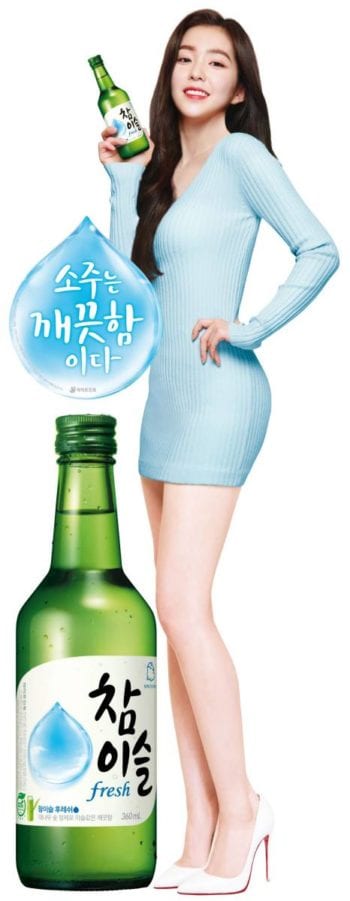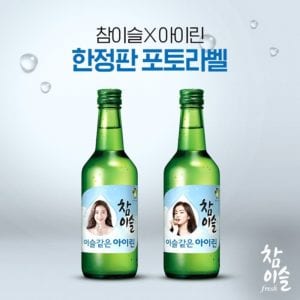South Korea: Plans to Ban Celebrities from Alcohol Labels
 South Korea may ban images of celebrities from alcoholic beverage labels as part of a broader effort to deglamorize alcohol use, the health ministry has announced.
South Korea may ban images of celebrities from alcoholic beverage labels as part of a broader effort to deglamorize alcohol use, the health ministry has announced.
The move will require changing an ordinance regulating advertisements in the National Health Promotion Act. The Ministry of Health and Welfare is working to ammend the legislation to better regulate alcohol marketing, according to the Yonhap News Agency.
The fallout from [alcohol consumption] in South Korea is serious, but compared to tobacco prevention campaigns, efforts by the government in this field have been insufficient,” the ministry announced.
For example, cigarette packages are covered with warning labels and graphic images showing the health risks posed by smoking. But alcohol containers are instead covered with celebrity faces.
Data showed that for 2019 alone, South Korea spent 138.8 billion won (US$120 million) to push forward tobacco prevention projects.
In contrast, only 1.3 billion won has been earmarked for alcohol prevention campaigns. But both tobacco and alcohol are categorized as Group 1 carcinogens. Already in 2018 calls for made to regulate alcohol like tobacco.
The ministry said using labels with images of celebrities, which is a common practice in ads, can give the wrong impression and glamorize alcohol. It added that among Organization for Economic Cooperation and Development (OECD) countries, South Korea is the only member that permits such practices.
YNA reports that, Rep. Nam In-soon of the ruling Democratic Party said that celebrities were exerting considerable influence over impressionable young people, and it was best not to allow such alcohol marketing practices to continue.
Unethical alcohol marketing rampant in South Korea
Examples are many of how the marketing practices of the alcohol industry clearly transgress ethical limits. For example, singer Irene from the girlband Red Velvet is the face of Chamisul soju, produced by HiteJinro, the world’s largest soju maker.
HiteJinro received public criticism already in 2016, as IOGT International reported at the time, for unethical alcohol marketing.
South Korea’s leading distiller had chosen a new, appalling marketing strategy for a fresh wave of TV commercials. New ads were featuring some of the country’s hottest K-pop stars. The ad campaign was called “Tipsy Live” – clearly glamorizing alcohol and intoxication.
Irene and K-pop group Red Velvet are heavily engaged in marketing chamisul to their fans.
[INFO] Limited edition bottles with CHAMISUL x #IRENE photo labels have been revealed.https://t.co/9x61PmRAqC #REDVELVET @RVsmtown pic.twitter.com/7mmZnxr2gD
— 5REDVELVET (@5REDVELVET) March 1, 2019
Red Velvet is a South Korean girl group and is regarded as one of the most popular K-pop groups worldwide. The majority of Red Velvet fans are young women. In February 2018, Time magazine named Red Velvet as one of the best K-pop groups, highlighting their versatile musical styles.
The band was also recognized for their brand recognition and marketing power, having topped the ‘Girl Group Brand Power Ranking’ published by the Korean Corporate Reputation Research Institute for three consecutive months.
This context explains the marketing strategy of the alcohol industry to recruit girls and young women as new consumers. In South Korea, almost half of all women live free from any alcohol consumption in any given year, according to WHO data.
Alcohol harm in South Korea
As reported by WHO, alcohol per capita consumption in the country is at 10.2 liters which is higher than in 2010 and comparatively above the average of the WHO Western Pacific Region. Alcohol consumption us high and keeps rising and so is the burden of alcohol harm in the country:
 Binge alcohol use in alcohol-consuming youth between 15 to 19 years is staggering with 58.5% engaging in heavy episodic alcohol use.
Binge alcohol use in alcohol-consuming youth between 15 to 19 years is staggering with 58.5% engaging in heavy episodic alcohol use.- Alcohol use disorders among men is at an alarming 21.2%. Even for women, alcohol use disorder (6.8%) is significantly above the average of the region.
- Alcohol dependence for both men and women is 5.5% which is also above the regional average.
- More than 5,000 cancer deaths are due to alcohol in South Korea every year.
The system of alcohol regulations in South Korea obviously needs more improvements that banning certain marketing practices – even though it is a good start.
—
For further reading:
Asia: Alarming Rise in Alcohol Use
South Korea: Regulate Alcohol Like Tobacco
After Crackdown on Tobacco Advertising, Will Alcohol be Next?

